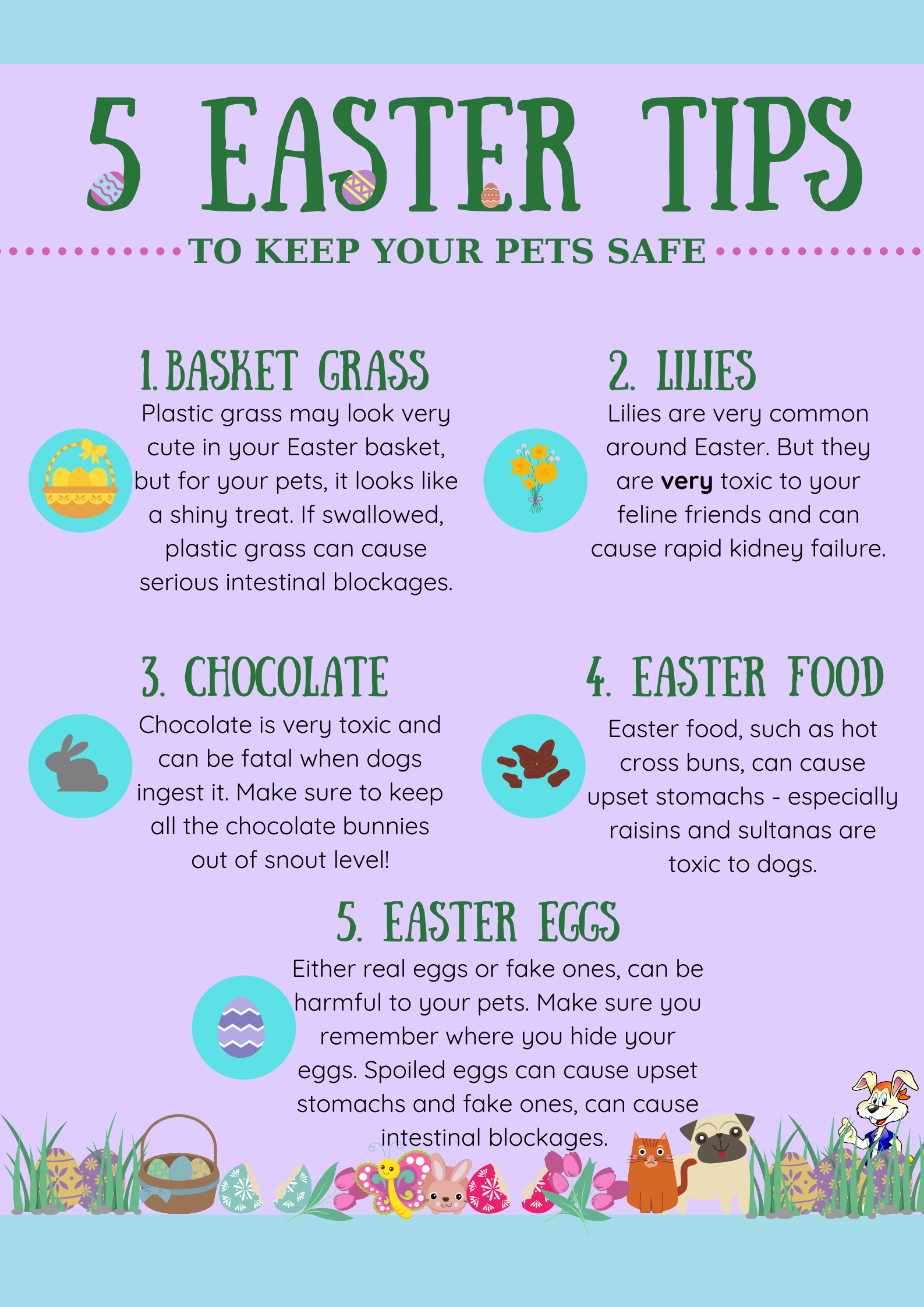The Easter period is a lovely time of the year, where the days are brighter and you can look forward to a few sweet treats. However, it’s important to remember that some of the most popular Easter snacks, like chocolate and hot cross buns, can be harmful for your adorable pets. This blog outlines some of the toxic items to keep away from your pets, including Easter foods and hazards you need to be aware of, in order to keep your pets safe and healthy.

Basket Grass
If you love celebrating the Easter period and enjoy decorating your home, please be mindful that some of these decorative additions may be damaging for your pets. Some people like to fill Easter baskets with plastic grass or use this as an attractive table runner. While it might look lovely, pets may unknowingly look at this as a nice, shiny treat. If they were to try and eat it, this could be very harmful. Swallowing plastic grass like this could potentially cause intestinal blockages that can be very serious.
Lilies
Lilies are a beautiful choice for spring floral arrangements, which means we are likely to see more of them at this time of year. Cat owners may want to avoid lilies in the home, as they are extremely toxic for cats. They are actually so dangerous, that it can be fatal even if a cat drinks the water from a vase that contains lilies. If you do have lilies at home, it’s vital that they are kept well out of reach of your cherished pets. Even if cats simply brush past lilies, the pollen can fall onto their fur and can still cause poisoning when they clean themselves.
Sadly, lilies can cause rapid, kidney failure for cats, so it really is important to be mindful of the dangers of this common household flower.
Chocolate
Chocolate is toxic for most household pets including cats and dogs, although it can be particularly dangerous when dogs ingest it.
Chocolate contains a chemical called theobromine and unfortunately, pets can’t digest this in the same way that us humans can. For pets, eating chocolate can cause sickness and diarrhoea. It can also make your pet urinate more frequently and in some cases could cause fits and even death.
It’s so important to keep chocolate out of reach from your pets all year round but at Easter time, there’s bound to be more chocolate around the house. Please be careful and keep any Easter eggs or sweet treats out of the way. Your pets may be tempted by the smell and try to get to them when you are not looking, so it’s a good idea to keep chocolate somewhere you know your pet can’t get to it.
Easter food
We’ve already mentioned that Chocolate is toxic for pets but there are other foods that are particularly popular at Easter, that could be harmful for your pets too. Tasty hot cross buns are an Easter staple but can be dangerous for both cats and dogs. Grapes, sultanas, raisins and currants are all toxic and as currants can be found in hot cross buns, we’d recommend keeping these out of reach of your pets.
Please make sure you don’t give your pet human food as a ‘treat’ as this can often be dangerous for them. Be mindful that certain snacks and breads may have raisins or currants that you can’t see, so please avoid giving human snacks and stick to safe pet treats instead. If eaten, grapes (and all of their dried forms like sultanas) can make your pet very poorly and can even cause kidney failure. Make sure everyone in your household is aware of these dangers and this will help to keep your pets safe.
Easter Eggs
When we say Easter eggs, your first thought may be chocolate and while these should of course be kept out of the way from your pets, it’s important to be careful with decorative Easter eggs too, as these can also be a problem.
If you are planning a fun Easter egg hunt for your family, please remember where you have hidden the eggs. Whether they are real eggs, chocolate eggs, or fake plastic eggs, they can all cause harm to your pets. Real eggs that are spoiled can cause stomach upsets, chocolate eggs as mentioned are very toxic and swallowing plastic eggs could lead to an intestinal blockage.
If you suspect that your precious pet has eaten something they shouldn’t have, you notice changes in their behaviour or you have any concerns at all, please don’t hesitate to contact us on- 0208 674 7342 or bring your beloved pet to see one of our experienced vets. We will be more than happy to offer advice. Remember, you can also book an appointment for your pet online.




